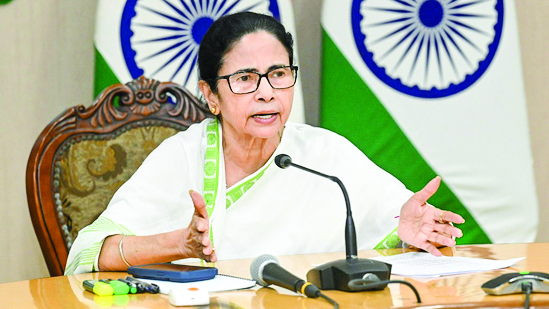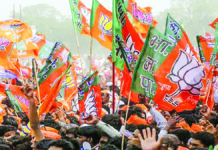KOLKATA: On April 22, a devastating terrorist attack in Pahalgam, Kashmir, claimed the lives of 26 tourists, all Hindu males, marking one of the deadliest assaults on civilians in the region since the 2008 Mumbai attacks. An offshoot of the Pakistan-based Lashkar-e-Taiba claimed responsibility for the targeted killing of the Hindu tourists. Condemnation of the targeted killings of Hindus resonated across the country and the world.
From the US President Donald Trump, Vice-President J.D. Vance who, in fact, was in India, to Tulsi Gabbard, U.S. Director of National Intelligence, leaders from countries across the world expressed support for India and directly blamed Islamist terrorists.
Tulsi Gabbard said: “We stand in solidarity with India in the wake of the horrific Islamist terrorist attack, targeting and killing 26 Hindus in Pahalgam. My prayers and deepest sympathies are with those who lost a loved one, pm @narendramodi, and with all the people of India. we are with you and support you as you hunt down those responsible for this heinous attack.”
However, West Bengal Chief Minister Mamata Banerjee remains the only political leader who has refused to call out Islamic terrorists for the massacre, leading to accusations from the Opposition Bharatiya Janata Party which cited this as “another example of her Muslim appeasement policy with an eye on the 2026 Assembly pols”.
She avoided statements calling the perpetrators as “Islamic terrorists,” instead used terms like “terrorists” and “anti-national forces,” asserting that “terrorism has no religion”
Banerjee insisted: “The terrorists do not have any class or religion, and should be shown no mercy.”
Instead, the Trinamool Congress leadership launched scathing attacks against the Union Government over the Intelligence failure behind the Pahalgam massacre. “Those who are in power in the country and make tall claims about the internal security of the country should take responsibility for the massacre. So many people were killed just because of the security lapses,” said West Bengal Power Minister Arup Biswas, close aide of the West Bengal Chief Minister.
Sources close to the Trinamool Congress (TMC) say that Banerjee’s reluctance stems from a strategic need to maintain her party’s secular image and voter base.
Political analysts say West Bengal’s significant Muslim population, which constitutes nearly 30 per cent of the State’s electorate, is a critical support base for the TMC. Directly blaming “Islamic terrorists” risks alienating this demographic, potentially weakening her political stronghold in the State.
Political analyst Suman Chattopadhyay told The Sunday Guardian: “Mamata’s messaging is carefully calibrated to avoid communal polarization, which could backfire in West Bengal’s diverse electoral landscape.” Additionally, Banerjee’s stance aligns with her broader critique of the Central Government’s handling of security in Jammu and Kashmir. By focusing on governance failures rather than specific ideological labels, she shifted the narrative to demand accountability from the ruling Bharatiya Janata Party.
Banerjee’s regional political imperatives have come at a great price for the inhabitants of her State.
Just weeks ago, encouraged by her full-throated support to opponents of the Waqf Amendment Act, thousands of Muslim youth ran riot in Murshidabad, a district bordering Bangladesh with more than 70 per cent Muslims.
A father-son duo, who used a make a living by fabricating idols of Hindu Gods and Goddesses, were hacked to death by the mob of Muslim youth. Hundreds of homes of Hindus were ransacked, looted and burnt down. Thousands of Hindus had to escape by crossing the river Hooghly and taking shelter in neighbouring Malda.
The BJP has accused the Chief Minister of putting politics over patriotism.
State BJP chief Sukanta Majumdar said: “Mamata wants the full support of the Islamist jihadis. So, her administration and her police are all united in appeasing the Muslims. Just a day back, Mamata’s police prevented people from burning the Pakistan flag in Barasat, 50 km from Kolkata. They said they had strict orders not to allow any such protest in a ‘sensitive spot’. I want to ask them, is Barasat part of India or Bangladesh?”
Says Prof. Raja Gopal Dhar Chowdhury, who has tracked Mamata Banerjee’s political journey for decades: “West Bengal’s demographic composition significantly shapes Mamata Banerjee’s political strategy. According to the 2011 Census, Muslims constitute approximately 27 per cent of the State’s population. The community forms a critical vote bank for the TMC, particularly in districts like Murshidabad, Malda, and North Dinajpur, where Muslims are in a majority. The TMC’s electoral successes, including its landslide victory in the 2021 West Bengal Assembly elections, have relied heavily on this support, which views Mamata as a defender against the BJP’s Hindutva agenda.”
Says political analyst Subhomoy Mitra: “Directly blaming ‘Islamic terrorists’ for the Pahalgam attack risks alienating this voter base, who may perceive such language as endorsing anti-Muslim sentiment, a narrative frequently associated with the BJP. Mamata’s use of neutral terms like ‘culprits’ and ‘anti-national forces’ allows her to condemn the violence without inflaming communal tensions, preserving her appeal among Muslim voters.”
Mamata Banerjee has consistently avoided religious labels in addressing terrorism-related incidents, a pattern evident in her past responses:
During the 2016 Dhulagarh Riots, she attributed the violence to “local disputes” rather than religious extremism, downplaying communal angles.
In 2023, when the National Investigation Agency uncovered a Jamaat-ul-Mujahideen Bangladesh module in Bengal, Mamata criticized the Central Government for “politicizing terror,” focusing on crime rather than religious profiling.
Even during the 2019 Pulwama attack, Mamata Banerjee blamed the attack on “intelligence failure” by the Central Government, avoiding direct references to Islamic terrorism.








